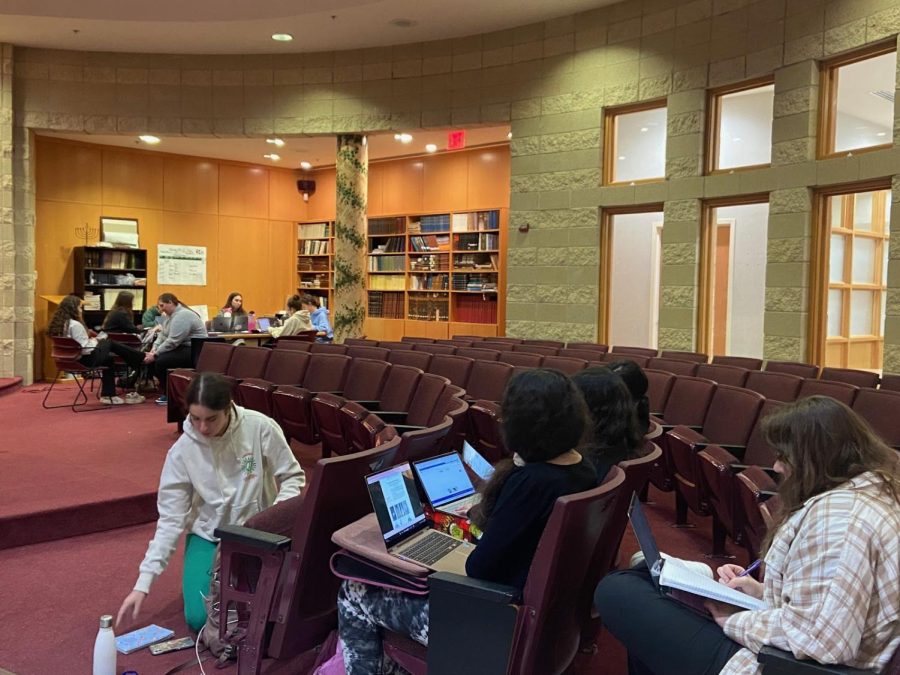JDS tackles sub shortages with new system
Period four students with absent teachers gather in the Beit Midrash for a joint silent study hall.
February 17, 2023
Every morning, high school students check their inboxes in anticipation, waiting to see which teachers are absent for the day. While most walk to their classrooms as usual, others head to the Beit Midrash or exhibition hall for a joint study hall for classes with absent teachers.
CESJDS, like many schools around the country, has struggled post-pandemic to hire outside substitutes. In the past, when teachers knew they would be absent, they would ask a colleague to step in for them. This resulted in tons of emails sent to teachers every morning, requesting them to step in last minute.
“I think teachers were feeling really overwhelmed,” High School Principal and Head of Campus, Dr. Lisa Vardi said. “They were feeling guilty if they had to be out because they were ill because then they had to find somebody else to cover.”
The new system, which started in mid-December, is how JDS is dealing with the lack of substitute teachers and the stress it causes teachers. Vardi and the core leadership team came up with the new system, which was tested last January. Staci Koester, Registrar and College Guidance Associate, organizes the substitute schedule.
Teachers can opt to be substitutes during their free periods by signing up on a spreadsheet. If teachers know in advance of their absence, they email the substitute inbox, and teachers who signed up to substitute for that period are called in. The school aims to have four people signed up for each period, so they keep track and rotate who is subbing. When there is more than one teacher out for a period, the classes are moved to the Beit Midrash or another empty space for a silent study hall.
For each period they substitute for, teachers are compensated comparably to outside subs. If there is a joint study hall, the pay is doubled. Teachers are not required to act as substitutes, but many choose to.
A survey conducted by Vardi shows that of the 36 high school faculty who responded, 67% agree that the new substitute system has been effective and 75% agree that JDS should continue using the new substitute system.
“When I was on the Toronto trip with basketball, we got stuck there for two days. I had to get three extra classes covered that I wasn’t anticipating,” Victoria Simonetti, kinesiology and sports med and emergency care teacher, said. “It was really really convenient to know that I didn’t have to actually find that coverage, that I just had to put in for it. Beforehand it was really stressful to have to locate coverage every time you were going to be gone.”
While there are many benefits to the new substitute coverage system for teachers, some students have a negative view on the system.
“Sometimes you’ll be able to collaborate with classmates, and sometimes you’re just sitting there, unmotivated to do anything,” freshman Noyln Ziman said. “…Sometimes I get more distracted because there’s some classes that just have a study hall and some that have work.”
While the study halls are supposed to be silent, the environment varies depending on the teacher, the number of classes present and the types of classes. Some are completely silent study halls where students are extremely productive, and others are louder and more distracting.
“I think that if the teacher is clear at the beginning of the period that it needs to be silent or very quiet small collaboration, that students are able to get work done,” High School Jewish Texts Department Chair Grace McMillan said. “I have had students say to me, ‘thank you for enforcing the quiet workspace because I was actually able to get work done.’ So I think when students have that environment, it can be a very positive, productive time for them.”
Vardi plans to address the faculty about the need for the study halls to be silent.
The middle school is also considering switching to this new system as it has been successful in the high school.
“I think it’s been very positive for teachers in the sense that they’re not feeling like they’re being inundated with requests,” Vardi said. “They don’t feel guilty when they have to be out sick that they’re actually imposing on their colleagues because we’re a very tight community.”








